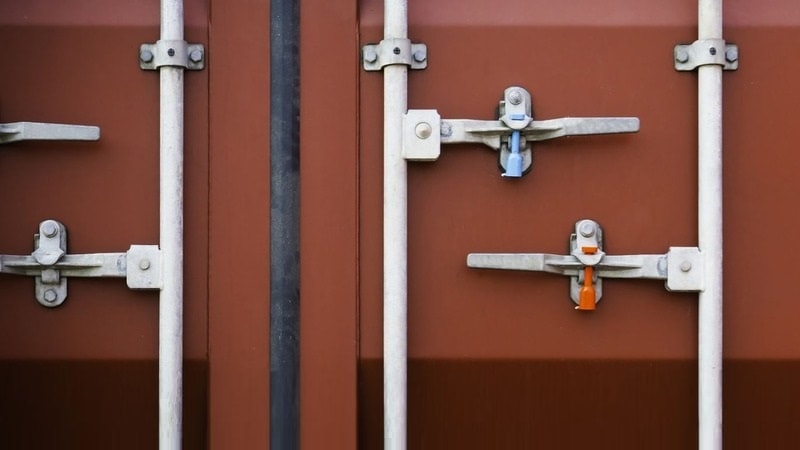With expanding global trade, security concerns in transportation are growing at an alarming pace. The risks of theft, tampering, and unauthorized access to shipments have become more prevalent, making strong security measures necessary. So, companies must know how to secure their cargo, trucks, and containers during transit.
Though selecting the best security seals for trucks requires some technical knowledge, we’ve simplified everything for you in this detailed post. Here, we present a list of the ten most popular security seals for trucks and expert tips to help you choose the right seal for your needs. Let’s start with the basics.
Why Are Security Seals Essential for Trucks and Trailers?
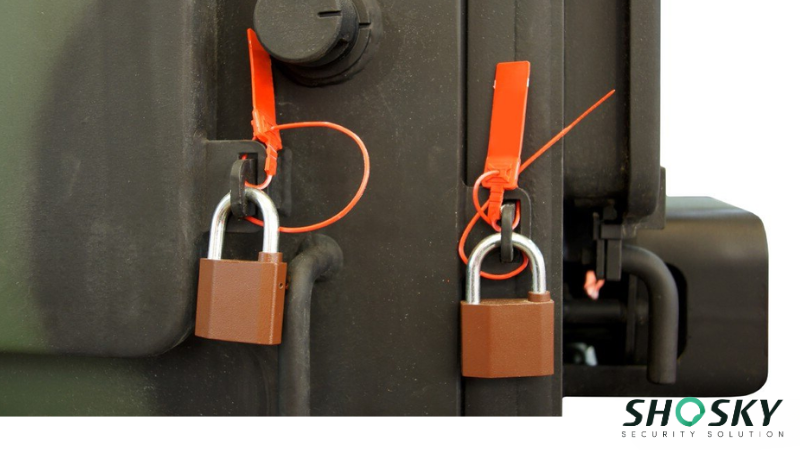
Truck security seals are mechanical devices that secure cargo trucks, containers, or trailers. The seals act as barriers against tampering and deter unauthorized access by providing clear, visible evidence of breakage or removal, alerting the authorities of potential theft or mishandling.
To evaluate the security level of a seal and determine its feasibility for specific applications, it is assessed according to industry security standards. Below are some of the primary standards for logistics transportation:
| Standards | Brief Explanation |
|---|---|
| ISO (International Organization for Standardization) 17712 | Defines the specifications for high-security seals and classifies them into unique security levels. |
| C-TPAT (Customs-Trade Partnership Against Terrorism) | Program by U.S Customs and Border Protection that sets security standards for safe cross-border trade. |
| TIR (Transports Internationaux Routiers) Convention | A global customs agreement that allows goods to be transported across borders. |
Understanding Truck Seal Security Levels (ISO 17712)
The ISO 17712 standard defines how truck and container security seals are tested and classified. It helps logistics teams choose the right seal based on the level of protection needed. Under this standard, seals are divided into three main categories: Indicative (I), Security (S), and High-Security (H).
Indicative (I) Seals
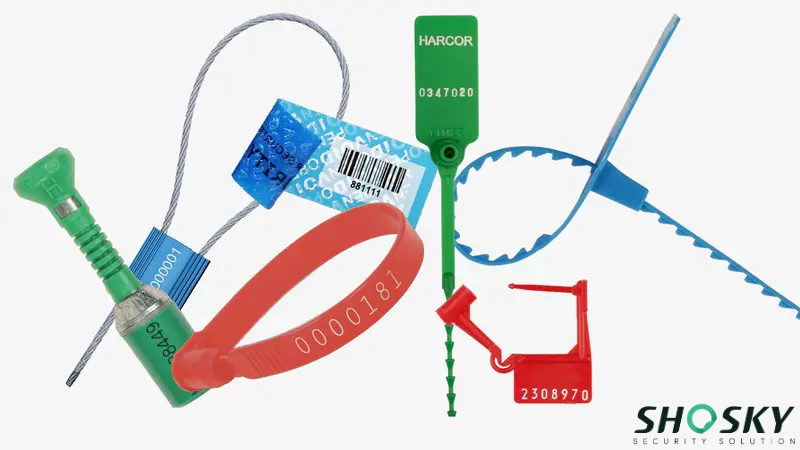
Indicative seals provide the most basic level of protection in truck and container security. They are often made of plastic or thin metal and serve mainly as visual indicators of tampering. Once broken or removed, they clearly show that the package or compartment was accessed.
These seals are ideal for low-risk shipments or domestic transport where the priority is to detect unauthorized access rather than prevent it. Common applications include non-critical goods, storage rooms, and short-haul deliveries where quick inspection and low-cost security are preferred.
Security (S) Seals
Security seals offer a stronger level of protection compared to indicative seals. Built from durable materials like metal or thick plastic, they require tools such as cutters or pliers for removal, adding an extra layer of resistance against tampering.
They are commonly used for regional transport, warehouse transfers, and mid-value shipments. These seals balance cost and security effectively, making them suitable for operations that need reliable tamper resistance without the complexity of high-security seals.
High-Security (H) Seals
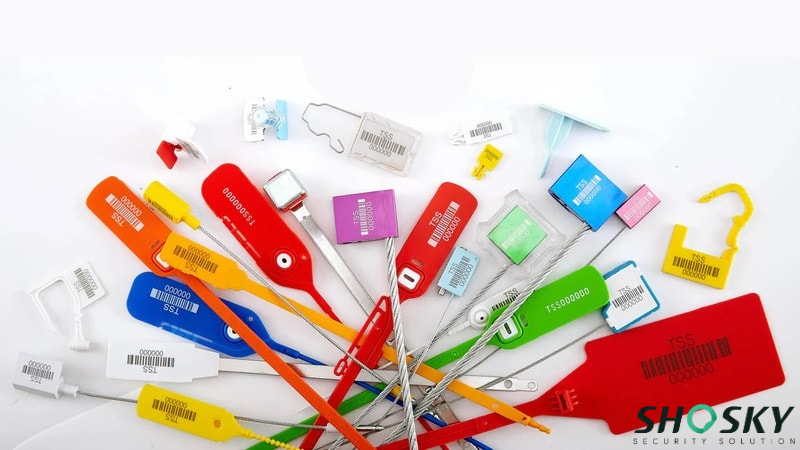
High-security seals are built for maximum strength and durability. Made of heavy steel or metal alloys, they are designed to withstand force, cutting, and manipulation. These seals must pass rigorous testing for strength and impact resistance.
According to ISO 17712 and C-TPAT (Customs-Trade Partnership Against Terrorism) requirements, H-class seals are mandatory for international shipping. They protect containers from unauthorized entry and help ensure compliance with global supply chain security regulations.
Using the right seal classification based on your cargo value and shipping route helps maintain supply chain integrity, reduce theft risk, and meet compliance standards across borders.
10 Types of Security Seals for Trucks and Their Applications
Here’s a list of the best security seals for securing truck doors, trailer latches, cargo compartments, and goods.
| Seal Type | Applications | Cost |
|---|---|---|
| Bolt Seals |
| High |
| Cable Seals |
| Moderate |
| Plastic Pull-Tight Seals |
| Low |
| Padlock Seals |
| Low |
| Fixed-Length Seals |
| Low |
| Twist-Wire Seals |
| Low |
| Barrier Seals |
| High |
| Metal Strap Seals |
| Moderate |
| RFID-Enabled Seals |
| High |
| GPS-Enabled Seals |
| Very high |
Now, we’ll briefly discuss each type of security seal, including its mechanism and the level of security it provides. We’ll also see the typical applications of each seal and its advantages.
1. Bolt Seals
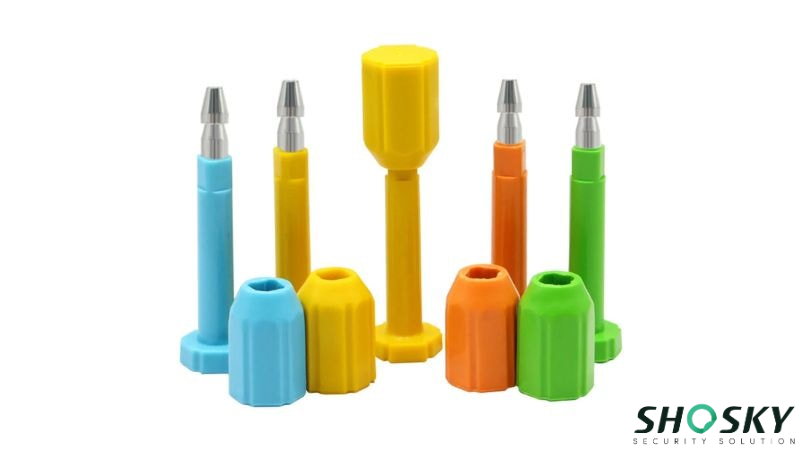
Bolt Seals are the most popular type of tamper-evident seals used to secure cargo containers and trucks. They consist of a cylindrical metal shaft and a female locking chamber. The chamber has a metal ring on the inside that secures the shaft in place.
These seals are designed for single use only and often feature unique serial numbers or logos. Applying bolt seals is easy and manual, and does not require any machinery. Once locked, the seal cannot be removed without special bolt cutters, ensuring safe transport.
Bolt seals are mostly ISO-17712 and C-TPAT certified and provide high security, which makes them a recommended choice for international shipments. Using bolt seals for truck doors and trailer latches makes tampering easily detectable, so shipments reach their destinations safely.
Applications
- International shipping containers
- Trailer doors
- High-value cargo
Advantages
- Compliance with ISO-17712, C-TPAT, and TIR Convention
- High security
- Tamper-evident
2. Cable Seals
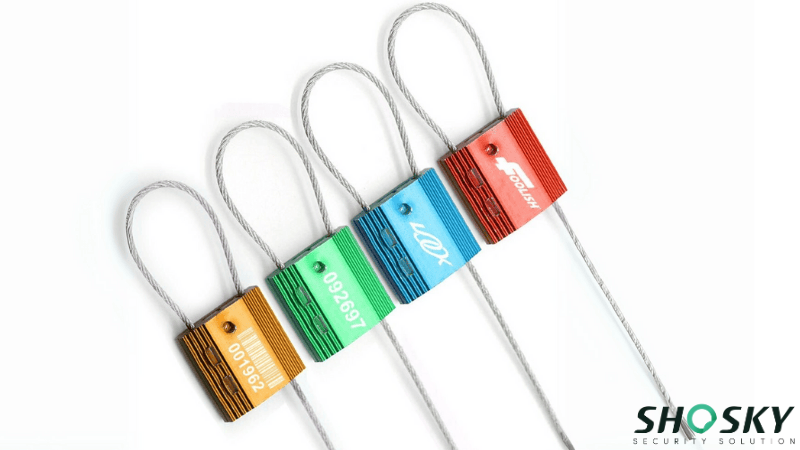
Cable seals are another common security solution used across various industries to secure goods and prevent unauthorized access. These seals have a flexible metal wire and a lock that grips the wire. They often have serial numbers or barcodes imprinted for identification and traceability.
The application process is quick and user-friendly, with no need for tools or machines. You just need to thread the cable through the truck locking point, insert it in the lock, and pull it tight. Cable seals provide reasonable protection against theft, as they require strong cutting tools for removal, which can slow down tampering.
These seals are cost-effective but don’t provide the same level of protection as high-security seals. They are ideal for irregularly shaped or hard-to-reach locking points and are commonly used for high-value goods transported over short distances.
Applications
- Tankers carrying fuels or liquid goods
- Perishable refrigerated items cargo
- Bulk shipments
Advantages
- Affordable
- Easy-to-use
- Tamper-evident
3. Plastic Pull-Tight Seals
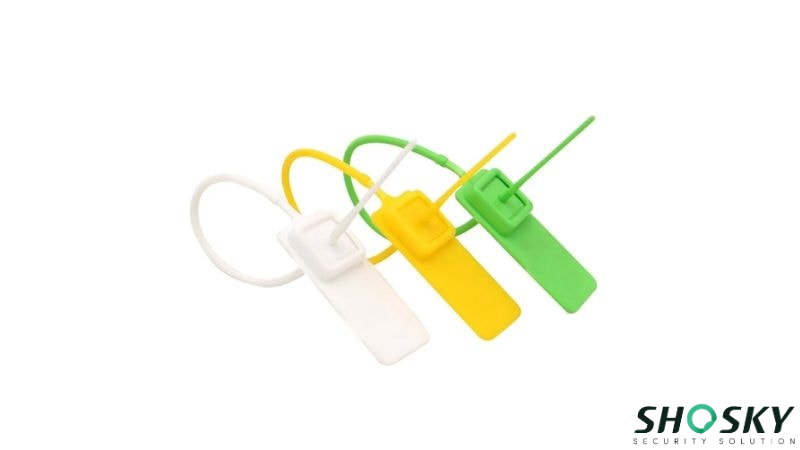
Plastic pull-tight seals are another popular type of tamper-evident seal used in logistics and transportation. These seals are lightweight and adjustable, making them ideal for applications requiring flexible and reliable sealing. They are made from plastic and offer low-to-medium security.
These types of seals are easy to use, with a variable strap and locking mechanism. To create a secure seal, pass the strap through the truck locking point, insert its tail into the locking chamber, and pull the strap tightly. These seals are for single use and can only be opened by a seal cutter.
Plastic seals are often used to secure bags and pouches in trucks, trailers, and cargo containers. They are also used to protect fire extinguishers and utility meters. They are often printed with serial numbers. If the seal is broken or doesn’t match the recorded serial number, it can signal tampering.
Applications
- Non-critical goods
- Short-distance shipments
- Garbage collection trucks
Advantages
- Cost-effective
- Adjustable
- Lightweight
4. Padlock Seals
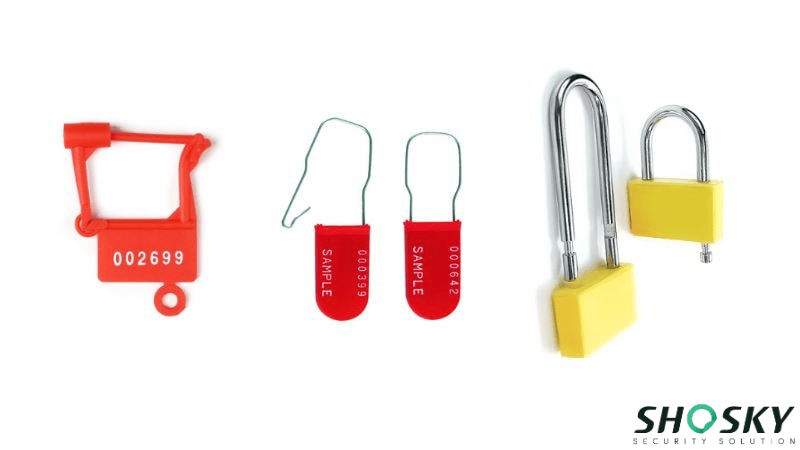
Padlock seals are versatile security tools that prevent goods from unauthorized access and tampering during transit or storage. The seals can be categorized into full-plastic seals, plastic seals with metal wire, and plastic seals with metal rods, arranged in increasing levels of security, with metal rod seals offering the highest protection.
The application process typically involves inserting the shackle through the locking mechanism and closing it to create a secure seal. Padlock seals can show clear signs of tampering, such as broken or cut shackles, cracks, and missing or altered serial numbers.
Padlock seals are both tamper-evident and tamper-resistant. These seals are commonly used to secure truck doors, trailer latches, and cargo compartments. They also protect retail goods, small parcels, medical supplies, and drug store cabinets.
Applications
- Small or medium-sized parcels
- Trailer latches
- Spare tyre compartments on semi trucks
Advantages
- Portable
- Inexpensive
- Tamper-evident
5. Fixed-Length Seals

As the name suggests, fixed-length seals are designed to have a fixed, predefined length. These seals are commonly made of plastic or metal and are for single use only. Fixed-length seals are both tamper-resistant and tamper-evident but provide a moderate level of security.
The application process for fixed-length seals is straightforward, requiring no tools or machinery. The seal is simply inserted into the locking mechanism with a push. A “click” can be heard confirming the seal is locked.
Due to their fixed size, these seals are suitable for situations where flexing doors or latches during transport can cause the adjustable seals to break. They are ideal for securing roller shutters, barn doors, and other transport latches.
Applications
- Roller shutters
- Lightweight goods
- Barn doors
Advantages
- Durable during transit
- Quick application
- Consistent and reliable security
6. Twist-Wire Seals
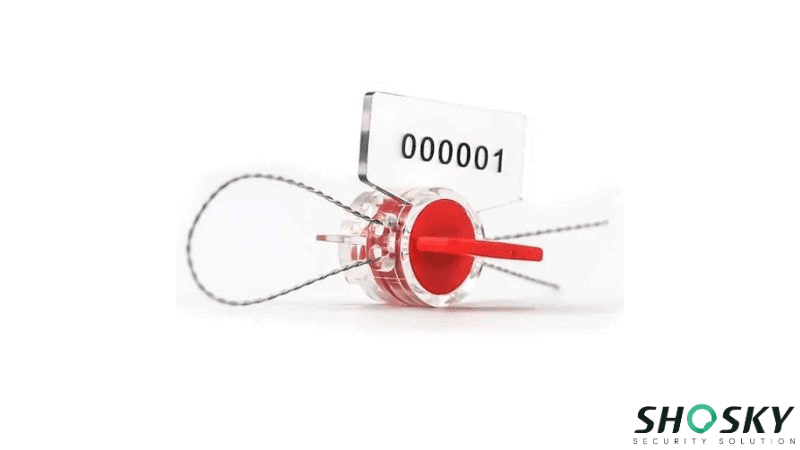
Another type of security seal commonly used for securing cargo during transit is a twist-wire seal. These seals consist of a thin wire and a locking mechanism. The head of the seal is usually marked with serial numbers or barcodes for tracking and to prevent unauthorized access.
Twist-wire seals consist of a thin wire threaded into the lock and twisted tightly to form a strong seal. They offer moderate levels of protection and are used where tamper evidence is important. To remove the seal, wire cutters or strong scissors must be used to cut the twisted wire.
These seals may be ISO certified for lower security levels. They can also be used in some C-TPAT-compliant logistics but are most commonly used for securing truck doors or trailers, containers with hazardous materials, and medical shipments.
Applications
- Hazardous chemical shipments
- Electrical control panels
- Food-grade trucks’ ventilation hatches
Advantages
- Resistant to harsh environmental conditions
- Easy application
- Economical
7. Bar Seals or Barrier Seals
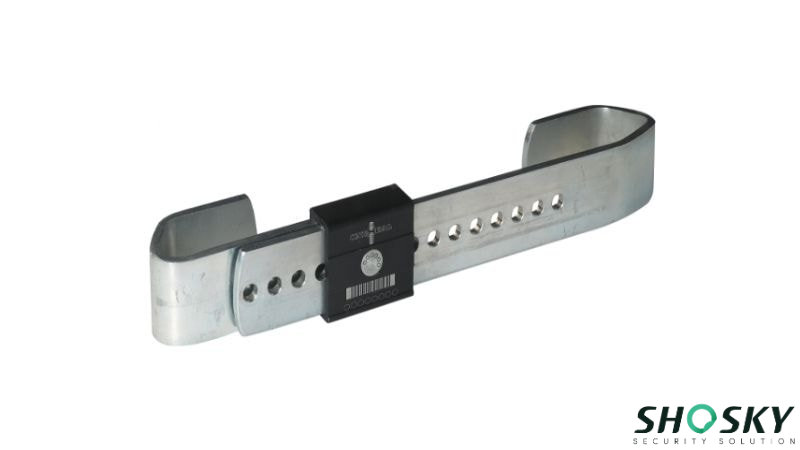
Bar seals (or barrier seals) are high-security, heavy-duty seals that protect goods during transit or storage. These seals are categorized as tamper-proof due to their exceptional strength and the highest level of protection against tampering. They are usually made of steel or metal alloys.
These types of seals offer a two-piece locking mechanism. The application involves securing the two sections around the container’s locking rods with a locking piece. Once secured, the seal forms a physical barrier requiring specialized cutting tools, making tampering highly unlikely.
Barrier seals generally comply with all important security standards discussed previously. They are commonly used to secure containers in cross-border shipments or trucks and trailers transporting high-value or sensitive cargo.
Applications
- High-value luxury products
- Sensitive government materials
- Highly sensitive pharmaceuticals
Advantages
- Highest level of security
- Compliance with industry standards
- High durability
8. Metal Strap Seals
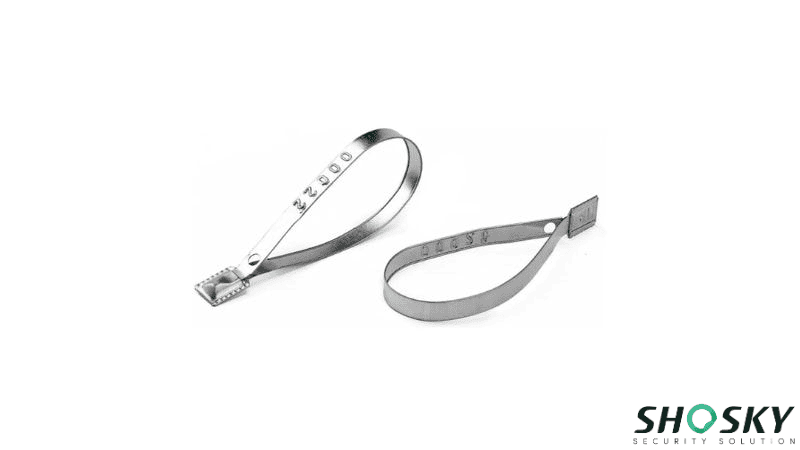
Next on the list is metal strap seals. These seals have a design similar to fixed-length seals, except here, the material for the straps is steel. They are categorized as tamper-evident and difficult to break without specialized tools.
To apply a metal strap seal, the strap is passed through the locking mechanism and secured by a tight pull and a clicking sound. Metal strap seals offer high security, and any unauthorized access is immediately detectable. For additional security, metal strap seals are often printed with serial numbers and barcodes.
Metal strap seals are also highlighted in ISO and C-TPAT standards. Customers should prioritize products that have the required certifications to ensure compliance with these regulations. These seals are also used for railcars, trolleys, truck doors, and cargo compartments.
Applications
- Industrial raw materials
- Agricultural products
- High-value furniture shipments
Advantages
- Compliance with high-security standards
- Durable
- Versatile
9. RFID-Enabled Seals

When it comes to modern security seals and advanced technology, RFID (Radio Frequency Identification) is gaining popularity. The RFID tags market is forecasted to grow at a CAGR (Compound Annual Growth Rate) of 8.4% and reach $16.09 billion by 2028. These seals are used for high-security applications where cargo identification and real-time tracking of tampering events are crucial.
RFID seals consist of a tag, which is a small wireless data transmission device. The tag contains a small embedded chip for storing and processing data and an antenna for transmitting data. The RFID seal can be applied without machinery by threading it through the locking point.
These offer tamper-evident and tamper-resistant qualities, and any attempt to alter the seal is recorded. RFID seals are often compliant with ISO 17712, C-TPAT, and TIR conventions, making them suitable for industries where maintaining supply chain integrity and protecting high-value products is crucial.
Applications
- Temperature-sensitive goods
- High-value electronics
- Sensitive medical equipment
Advantages
- Efficient supply-chain management
- Strongly tamper-evident
- Easy integration
10. GPS Smart Seals

Last but not least, we have GPS (Global Positioning System)– enabled seals. These seals combine sealing with the ability to monitor and track cargo location in real time during transit. They are tamper-evident, providing immediate alerts upon any compromise.
GPS-enabled seals have a physical locking mechanism, similar to traditional seals, but they also have an embedded GPS tracker. As the seal locks on the cargo or container, the GPS module continuously transmits data for location. These seals are typically battery-powered and can also track movements within container terminals for operational insights.
This type of seal is highly effective for securing cargo compartments and monitoring the vehicle’s route. It offers advanced protection against tampering but generally does not comply with traditional physical security standards.
Applications:
- Fleet management
- Military and government logistics
- Bank shipments
Advantages
- Real-time monitoring and traceability
- Increased protection
- Remote access
How to Choose and Use the Right Truck Seal?
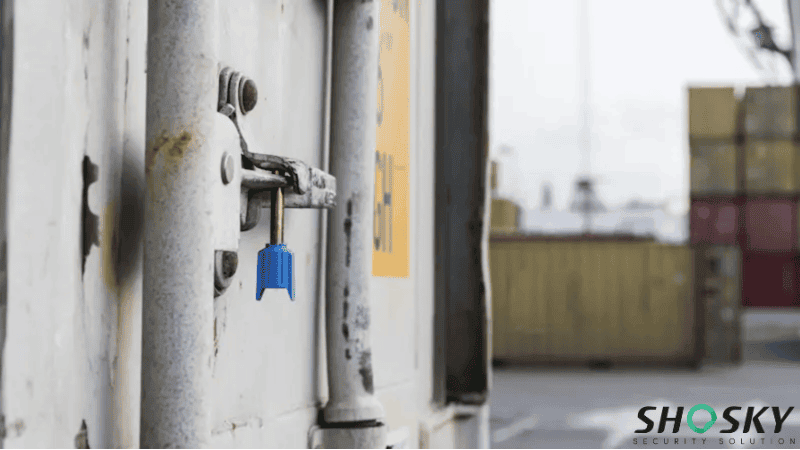
Selecting the right security seals for trucks depends on cargo value, transport distance, and risk level. International shipments with customs checkpoints require stronger seals, while local deliveries may only need basic tamper-evident options. The goal is to balance protection with practicality for each route.
Key points to consider:
- Security Level: Use ISO 17712 “H” high-security seals, such as bolts or heavy cable types, for cross-border or high-value shipments. For domestic routes, “S” or “I” seals (metal, cable, or plastic) are suitable.
- Seal-to-Latch Match: Bolt and bar seals fit container doors; cable seals are ideal for varied latch points; plastic seals work best for roll-up or internal doors.
- Environmental Conditions: Choose metal seals for hot, humid, or rough routes; flexible seals for trucks with vibration or flexing doors.
- Proper Application: Apply the seal firmly, verify the lock, and record the serial number using the VVTT (View, Verify, Tug, Twist) method.
- Documentation & Inspection: Keep seal records on the manifest or BOL, and check for tampering at every transit stop.
Once the right seal is selected, correct handling and consistent monitoring are just as vital. Every seal should be checked before and after each delivery point. Missing or damaged seals should trigger an immediate investigation to prevent cargo loss or contamination.
Training drivers, warehouse staff, and inspectors is also crucial. They should know how to apply, remove, and verify seals properly. A small lapse in attention can lead to security breaches, so consistent training and clear procedures help maintain cargo integrity throughout the transport process.
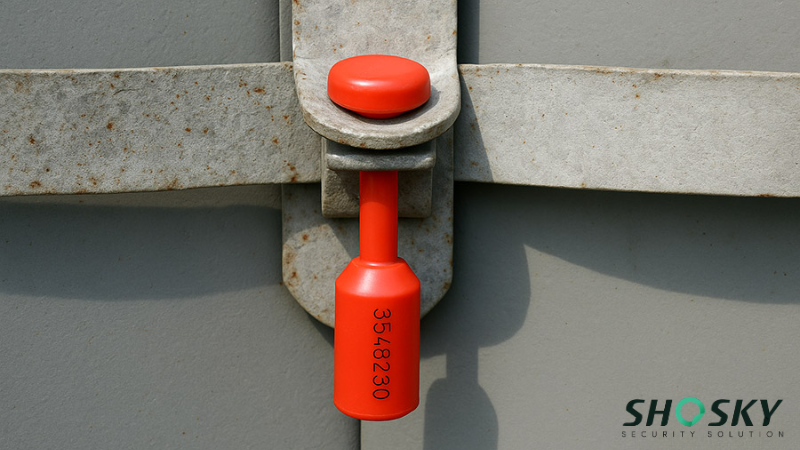
FAQs
Q1: Are security seals weather-resistant?
Yes, some security seals, such as twist-wire seals and RFID-enabled seals, are designed to withstand harsh environmental conditions.
Q2: How can I track my shipment using a GPS-enabled seal?
GPS-enabled seals track shipments in real-time and send alerts if compromised, providing security and monitoring during transit.
Q3: Which security seal is best for international shipping?
Bolt seals are ideal for international shipping due to their high-security standards, tamper evidence, and durability.
Q4: Can security seals be reused?
Most truck security seals are single-use, but electronic and GPS-enabled seals can be reused multiple times.
Q5: Do I need ISO-certified seals for local deliveries?
ISO certification is not required for local shipments, but it ensures higher reliability for long-distance or global logistics.
Conclusion
As technology continues to evolve, so does the ability to secure cargo more effectively. From RFID to GPS-enabled seals — these innovations provide not only tamper evidence but also enhanced tracking capabilities, making them ideal for high-value and sensitive shipments. Businesses should embrace these technologies to stay ahead of potential security threats.
Secure Your Cargo with Confidence!
At Shosky Security, we specialize in providing advanced tamper-evident solutions designed to meet the unique needs of various industries. Our advanced security seals, including RFID and GPS-enabled options, ensure that your cargo remains secure throughout its journey. Contact us to know how we can help you enhance your security measures.
